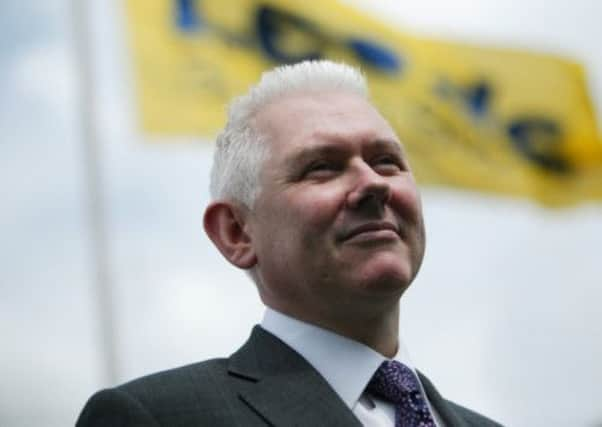Leeds reaps the rewards of lending policy


The mutual said half of all new loans were for higher loan-to-value, buy-to-let, shared ownership and self-build properties.
These give more people a hand on to the housing ladder and offer better returns than “super-prime vanilla” mortgages, said Peter Hill, the chief executive.
Advertisement
Hide AdAdvertisement
Hide Ad“In a market where some of the lenders have been a bit more reluctant to lend by historical comparisons, it’s a good thing that building societies like us are keen to lend,” he added.
Falling rates for savers, caused by cheaper funding from the Bank of England, also helped to generate stronger interest margins for the society.
This allows it to offer better than average returns to savers, added Mr Hill.
Leeds grew savings balances by £521m to £8.3bn and added 39,000 new members in the six months to June.
Advertisement
Hide AdAdvertisement
Hide AdBut the average rate paid to savers declined to 2.43 per cent, compared to 2.60 per cent the same time last year.
Inflation rose to 2.9 per cent in June, eroding savers’ returns.
Mr Hill said the Government’s overwhelming desire for economic growth means that it will tolerate a period of inflation.
He acknowledged that “life is tough” for savers but said Leeds is doing the best it can to support them.
Advertisement
Hide AdAdvertisement
Hide AdThe Bank of England’s Funding for Lending scheme, which the mutual has tapped for £250m, has depressed demand for savers’ deposits across the market.
The lender has reduced the amount it charges mortgage customers, passing on the cheaper cost of funding. Mr Hill said that while the economy and confidence in general might be improving, he does not expect interest rates to rise for another two or three years.
Householders might have reduced their levels of indebtedness, but earnings have failed to rise over the last three or four years, he added.
“Some of the policy moves, like quantitative easing, will take a lot of unwinding,” he said.
Advertisement
Hide AdAdvertisement
Hide Ad“I don’t think we are going to see a return to the high levels of growth we saw in the early years of the last decade.
“Growth will be more steady, rather than spectacular.”
The society said new residential lending increased 20 per cent to £921m, while net residential loans were up 26 per cent to £423m.
It said that it plans to “significantly” increase new mortgage lending this year.
The increase in savings balances helped the mutual reduce the mutual’s wholesale funding ratio to 17.4 per cent, compared to 19 per cent the same time last year.
Advertisement
Hide AdAdvertisement
Hide AdAll of its mortgages are funded by retail deposits, rather than having to rely on the money markets to support lending.
The society completed its debut securitisation last month, raising £300m from institutional investors by pooling together a group of mortgages. Mr Hill said the order book was strong.
Capital and reserves rose to 13 per cent in the first half to £629m. The society’s core tier one ratio – a key measure of financial strength – edged up to 14.1 per cent.
Leeds reported a leverage ratio of more than 5 per cent, well over the level set by the City watch-dog.
Advertisement
Hide AdAdvertisement
Hide AdIn the six months to June, the society has been reducing its exposure to the troubled commercial property market.
Commercial loan balances in arrears reduced to 7.7 per cent, from 11.3 per cent the same time last year.
But the lender has increased the charge for impairment losses and provisions for both commercial and residential by 32 per cent to £26.4m.
Total balance sheet mortgage provisions are now £86m.
Mr Hill said: “The commercial property market has been very difficult since 2008.
Advertisement
Hide AdAdvertisement
Hide Ad“Whereas in the residential market we saw property values fall then start to steadily increase, in the commercial property market values fell more significantly and we are only just starting to see signs of some sites starting to recover.”
The half-year report said the outlook for the sector remains challenging and any further slowdown will hit borrowers’ ability to repay their loans.
Hornsea Freeport, the East Yorkshire shopping centre acquired by Leeds in 2010 after lending £17m to its previous owners, is “trading okay”, added Mr Hill.
Residential arrears reduced to 2.27 per cent, from 2.76 per cent last year, in spite of the challenging economic backdrop.
Advertisement
Hide AdAdvertisement
Hide AdThe report added that the recovery remains relatively weak compared with historical standards and economic conditions will continue to present challen- ges.
It added: “The immediate threat emanating from the eurozone appears to have receded, but its fundamental problems re- main.
“Despite this economic backdrop, Leeds Building Society has been able to provide members with good value for money savings and mortgage products, help people buy their own homes and grow its total assets by 7 per cent to a record £10.8bn.”
bernard.ginns@ypn.co.uk